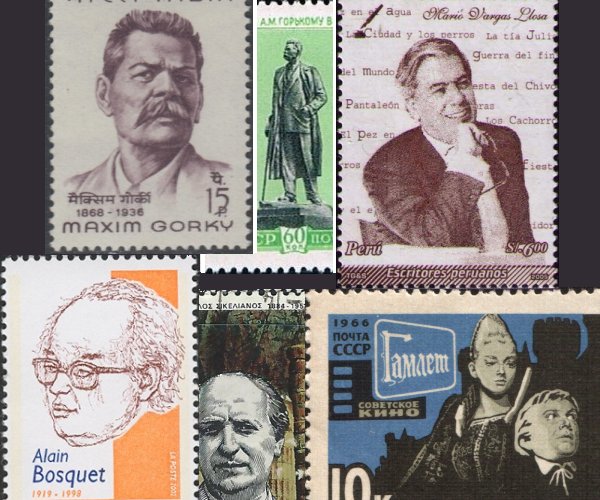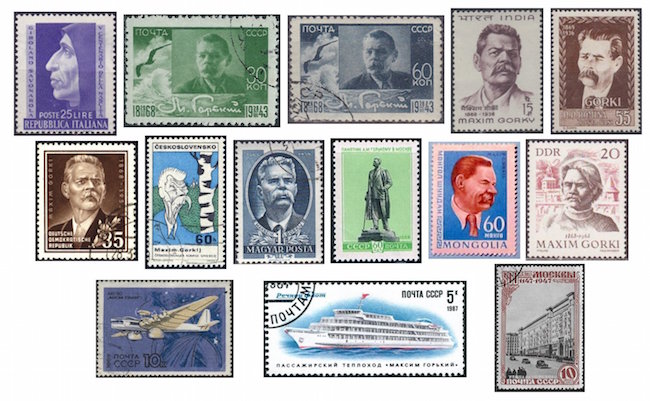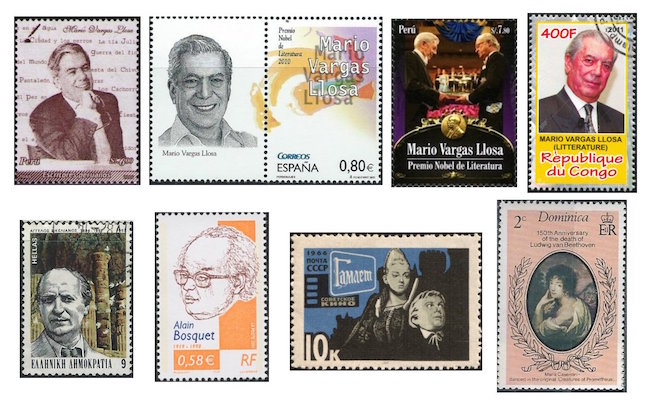The Arts on the Stamps of the World — March 28
An Arts Fuse regular feature: the arts on stamps of the world.

By Doug Briscoe
Although today is the birthday of two great musicians, Dutch conductor Wilhelm Mengelberg (1871-1951) and Bohemian-born American pianist Rudolf Serkin (1903-1991), I know of no stamps honoring them.
Some sources give the great artist Raphael’s birthday as 28 March, others say 6 April. We’ll show an array of Raphael stamps next week, as we already have one Renaissance master among today’s offerings.
And that painter is Fra Bartolomeo (March 28, 1472 – October 31, 1517), born Baccio della Porta in Tuscany. He fell under the sway of the fanatical Savonarola, whereupon Bartolomeo gave up painting and became a Dominican friar. He took up his brush again only on direct order from the Order, in order to benefit the Order. Almost all of his paintings are of religious subjects, and it is perhaps ironic that the only Fra Bartolomeo stamp I could locate shows his portrait of Savonarola, whom the stamp commemorates.
There is by contrast a plenitude of stamps honoring Maxim Gorky, the majority of them from former Communist Bloc nations. Alexei Maximovich Peshkov (28 March [O.S. 16 March] 1868 – 18 June 1936) traveled much in his youth, forming impressions and gaining life experience that would find their way into his powerful writing. He worked in journalism and adopted the pen name Gorky (Russian for “bitter”) in 1892. One may guess from this the nature of his polemical arguments. Firmly anti-Tsarist, he was arrested many times and became the darling of the Marxists and a friend of Lenin. By that time he had already befriended such literary greats as Chekhov and Tolstoy, and in 1904 opened a theater in his hometown that was supported by Stanislavski. He came to the US on a fundraising tour for the Bolsheviks in 1906, and from that year to 1913 lived in semi-exile on the island of Capri. He went back to Russia under an amnesty and grew critical of Lenin’s ruthlessness, calling him a “a cold-blooded trickster” and within a few years returning to Italy on account of his tuberculosis. Stalin himself invited Gorky to come home in 1932, but had him quietly placed under house arrest just two years later; there are those who believe that his death in 1936 was a murder carried out by NKVD agents. In happier times Gorky was championed by the regime as a symbol of the proletariat. As you probably know, the city where he was born, Nizhny Novgorod, was called “Gorky” for most of the Communist period. Airplanes, passenger liners, and streets were named for him, and I can show the stamps to prove it. Maxim Gorky was nominated five times for the Nobel Prize in Literature.

The political leanings of the great Peruvian writer and Nobel Prize winner Mario Vargas Llosa (born March 28, 1936) may have been absorbed in his earliest childhood, when he accompanied his mother and honorary consul grandfather to Bolivia. The child spent several years there before returning to Peru, where he discovered that his father was not dead, as he had been told, but had been separated from his mother since before his birth. The parents reunited. Like so many other writers, Vargas Llosa started in journalism in his teens. His first two novels established him as an important voice in Latin American literature. He became friendly with Gabriel García Márquez, but in a notorious incident punched him in the face in Mexico for reasons that remain unexplained. Vargas Llosa ran an unsuccessful campaign for the presidency of Peru in 1990 and since then has lived mostly in Madrid and concentrated on his writing. He won the Nobel Prize in 2010 and was ennobled by King Juan Carlos as the Marquis of Vargas Llosa in 2011.
Greek poet and playwright Angelos Sikelianos (28 March 1884 – 19 June 1951) spent forty days on Mount Athos with Nikos Kazantzakis in 1914. Seven years earlier he had married the American art promoter Eva Palmer, and together they created the 1927 Delphic Festival in an attempt to revive some of the principles of classical Greece. The festival offered athletics, a concert, a folk art exhibition, and a performance of the Aeschylean tragedy Prometheus Bound. The enterprise was repeated three years later, but the effort put a strain on the couple’s finances and marriage and was thereafter abandoned. Their house, though, is today the site of the Museum of Delphic Festivals. During World War II, Sikelianos earned the admiration of his countrymen by reading a newly composed patriotic poem at the funeral of poet Kostis Palamas. According to English language Wikipedia, he also penned the letter sent by Archbishop Damaskinos to the German authorities on behalf of Greek Jews, but there is no mention of this in the other sources I checked. Sikelianos published three books of his collected poetry in 1946-7 and was nominated for the Nobel Prize for Literature in 1949.

The poet Alain Bosquet (March 28, 1919 – 8 March 1998) led a most interesting life. Born Anatoly Bisk in Odessa, he grew up in Brussels from the age of six. He successively served in three armies during World War II, the Belgian, the French, and, having fled to Manhattan in 1942, the American. After the war he served as an advisor (with US citizenship) in occupied Berlin and met his future wife there. He founded a German language literary magazine in 1947, taught at Brandeis in 1958, and became a French citizen in 1980! He wrote about three dozen books of poetry and nearly two dozen novels.
Just six days ago we had occasion to use the Russian stamp seen here to mark the birthday of director Grigori Kozintsev. Now we see it again for the actor Innokenty Smoktunovsky (in the foreground) who played the role of Hamlet in Kozintsev’s 1964 film. Born Smoktunovich on 28 March 1925—wait a minute. Forgive me, I can’t help it—this gentleman’s name reminds me of that Monty Python routine: “My name is Smoketoomuch, Mr. Smoketoomuch…” (By an incredible coincidence, tomorrow is the birthday of Mr. Smoketoomuch himself, Eric Idle.) Anyway, handsome leading man Smoktunovsky was born in Siberia of Belarusian ancestry and served in World War II, beginning his acting career on the stage in Krasnoyarsk and Moscow. His first film was 1962’s Nine Days of One Year, directed by Mikhail Romm. His Hamlet was praised by Olivier himself. One of the finest films Smoktunovsky took part in later, albeit as a voice actor only, was Andrei Tarkovsky’s The Mirror (1975), which he narrated. Innokenty Smoktunovsky died in a sanatorium at the age of 69 on 3 August 1994.
We can also mark the 216th anniversary of the first performance of Beethoven’s ballet The Creatures of Prometheus, first presented on March 28, 1801, with a stamp from Dominica depicting the ballerina Maria Casentini (c1778-after 1805), who danced in the première. The stamp is one from a Beethoven series for the 1977 sesquicentennial of his death that reflects various aspects of his life.
No stamp yet for American bandleader Paul Whiteman (March 28, 1890 – December 29, 1967).
A graduate of the University of Massachusetts with a B.A. in English, Doug Briscoe worked in Boston classical music radio, at WCRB, WGBH, and WBUR, for about 25 years, beginning in 1977. He has the curious distinction of having succeeded Robert J. Lurtsema twice, first as host of WGBH’s weekday morning classical music program in 1993, then as host of the weekend program when Robert J.’s health failed in 2000. Doug also wrote liner notes for several of the late Gunther Schuller’s GM Recordings releases as well as program notes for the Boston Classical Orchestra. For the past few years he’s been posting a Facebook “blog” of classical music on stamps of the world, which has now been expanded to encompass all the arts for The Arts Fuse.

